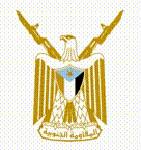أهلا وسهلا
----------------------------------------------------------------------------------------
"To have peace there must be strife; both are part of the structure of the world and requirements."
Muata Ashby
First Nuclear Weapon detonated 01/23/23
First Missile Launched towards the nation 01/19/23
https://soundcloud.com/politic-muzik/o-son-of-qassam
Proud Astronaut of Eclipse.
----------------------------------------------------------------------------------------
مع سلامة
| National Factbook |
| Flag: |

|
| Nation Name: |
Egypt Civil Republic |
| Leader Name: |
Supreme Commander |
| Currency: |

Egyptian Pound |
| National Animal: |

Golden eagle |
| History: |
The history of Egypt has been long and wealthy, due to the flow of the Nile River with its fertile banks and delta, as well as the accomplishments of Egypt's native inhabitants and outside influence. Much of Egypt's ancient history was a mystery until Egyptian hieroglyphs were deciphered with the discovery and help of the Rosetta Stone. Among the Seven Wonders of the Ancient World is the Great Pyramid of Giza.
Ancient Egyptian civilization coalesced around 3150 BC with the political unification of Upper and Lower Egypt under the first king of the First Dynasty, Narmer. Predominantly native Egyptian rule lasted until the conquest by the Achaemenid Empire in the sixth century BC.
In 332 BC, Macedonian ruler Alexander the Great conquered Egypt as he toppled the Achaemenids and established the short-lived Macedonian Empire, which gave rise to the Hellenistic Ptolemaic Kingdom, founded in 305 BC by one of Alexander's former generals, Ptolemy I Soter. The Ptolemies had to fight native rebellions and were involved in foreign and civil wars that led to the decline of the kingdom and its final annexation by Rome. The death of Cleopatra ended the nominal independence of Egypt, resulting in Egypt's becoming one of the provinces of the Roman Empire.
Roman rule in Egypt (including Byzantine) lasted from 30 BC to 641 AD, with a brief interlude of control by the Sasanian Empire between 619 and 629, known as Sasanian Egypt.[1] After the Muslim conquest of Egypt, parts of Egypt became provinces of successive Caliphates and other Muslim dynasties: Rashidun Caliphate (632-661), Umayyad Caliphate (661–750), Abbasid Caliphate (750–935), Fatimid Caliphate (909–1171), Ayyubid Sultanate (1171–1260), and the Mamluk Sultanate (1250–1517). In 1517, Ottoman sultan Selim I captured Cairo, absorbing Egypt into the Ottoman Empire.
Egypt remained entirely Ottoman until 1805, except during French occupation from 1798 to 1801.[2] Starting in 1867, Egypt became a nominally autonomous tributary state called the Khedivate of Egypt. However, Khedivate Egypt fell under British control in 1882 following the Anglo-Egyptian War. After the end of World War I and following the Egyptian revolution of 1919, the Kingdom of Egypt was established. While a de jure independent state, the United Kingdom retained control over foreign affairs, defense, and other matters. British occupation lasted until 1954, with the Anglo-Egyptian agreement of 1954.
The modern Republic of Egypt was founded in 1953, and with the complete withdrawal of British forces from the Suez Canal in 1956, President Gamal Abdel Nasser (president from 1956 to 1970) introduced many reforms and created the short-lived United Arab Republic (with Syria). His terms also saw the Six-Day War and the creation of the international Non-Aligned Movement. His successor, Anwar Sadat (president from 1970 to 1981) changed Egypt's trajectory, departing from many of the political, and economic tenets of Nasserism, re-instituting a multi-party system and launching the Infitah economic policy. He led Egypt in the Yom Kippur War of 1973 to regain Egypt's Sinai Peninsula, which Israel had occupied since the Six-Day War of 1967. This later led to the Egypt–Israel peace treaty.
Recent Egyptian history has been dominated by events following nearly thirty years of rule by the former president Hosni Mubarak. The Egyptian revolution of 2011 deposed Mubarak and resulted in the first democratically elected president in Egyptian history, Mohamed Morsi. Unrest after the 2011 revolution and related disputes led to the 2013 Egyptian coup d'état, Morsi's imprisonment and the election of Abdel Fattah al-Sisi as president in 2014. After a 6 year reigning period, Sisi has resigned, and the newly elected president, Supreme Commander has brought the country forward in a god and positive way. |
| Geography |
| Continent: |
Africa |
| Land Area: |
141,219.59 sq. km |
| Terrain: |
sand |
| Highest Peak: |
Mount Catherine ,
2,629 meters
|
| Lowest Valley: |
The Qattara Depression,
-435 meters
|
| Climate: |
Southern Egypt's landscape contains low mountains and desert. Northern Egypt has wide valleys near the Nile and desert to the east and west. North of Cairo, the capital, is the sprawling, triangular Nile River Delta. |
| People & Society |
| Population: |
12,314,328 people |
| Demonym: |
Egyptian |
| Demonym Plural: |
Egyptians |
| Ethnic Groups: |
The Egyptians - 97.0%
Bedouin - 2.0% |
| Languages: |
- 0.0% |
| Religions: |
Sunni Islam - 95.0%
Christianity - 5.0% |
| Health |
| Life Expectancy: |
89 years |
| Obesity: |
12.2% |
| Alcohol Users: |
54% |
| Tobacco Users: |
97% |
| Cannabis Users: |
21% |
| Hard Drug Users: |
12% |
| Economy |
| Description: |
The economy of Egypt used to be a highly centralized economy, focused on import substitution under president Gamal Abdel Nasser (1954–1970). During the rule of president Abdel Fattah el-Sisi (2014–present), the economy follows Egypt's 2030 Vision. The policy is aimed at diversifying Egypt's economy. The country's economy is the second largest in Africa after Nigeria regarding nominal GDP, and 33rd in worldwide ranking as of 2022. |
| Average Yearly Income: |
$235.70 |
| Gross Domestic Product (GDP): |
$23,140,742,766.00 |
| GDP per Capita: |
$1,879.17 |
| Gross National Income (GNI): |
$13,198,332,840.00 |
| Industries: |
Egypt's economy relies mainly on agriculture, media, petroleum imports, natural gas, and tourism |
| Military |
| History: |
The Egyptian Armed Forces (Egyptian Arabic: القُوّات المُسَلَّحَة المِصْرِيَّة, romanized: alquwwat almusalahat almisria) are the military forces of the Arab Republic of Egypt. They consist of the Egyptian Army, Egyptian Navy, Egyptian Air Force and Egyptian Air Defense Forces.[6] |
| Soldiers: |
37,400 |
| Tanks: |
25,500 |
| Aircraft: |
2,700 |
| Ships: |
170 |
| Missiles: |
0 |
| Nuclear Weapons: |
0 |
| Last Updated: 12/22/2024 11:38 pm |



















